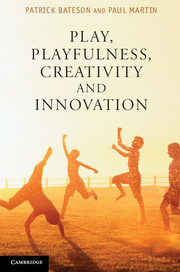Book contents
- Frontmatter
- Contents
- Advance praise
- Preface
- Acknowledgements
- 1 Introduction
- 2 The biology of play
- 3 The functions of play
- 4 Evolution and play
- 5 Creativity in humans
- 6 Animals finding novel solutions
- 7 People and organisations
- 8 Childhood play and creativity
- 9 Humour and playfulness
- 10 Dreams, drugs and creativity
- 11 Pulling the threads together
- Notes
- References
- Index
4 - Evolution and play
Published online by Cambridge University Press: 05 July 2013
- Frontmatter
- Contents
- Advance praise
- Preface
- Acknowledgements
- 1 Introduction
- 2 The biology of play
- 3 The functions of play
- 4 Evolution and play
- 5 Creativity in humans
- 6 Animals finding novel solutions
- 7 People and organisations
- 8 Childhood play and creativity
- 9 Humour and playfulness
- 10 Dreams, drugs and creativity
- 11 Pulling the threads together
- Notes
- References
- Index
Summary
This final chapter on biological aspects of play forms a further backdrop to our investigation into the links between play, playfulness, creativity and innovation. No serious biologist disputes that organisms have changed over geological time or that they continue to change, such as when insects acquire resistance to pesticides or bacteria acquire resistance to antibiotics. Other organisms have become extinct, many of them in the last decade. What requires explanation is the way in which these evolutionary changes take place. Darwin observed that since members of a species differ from each other, some are more likely to survive and reproduce than others. If the characteristics of these individuals were inherited by their offspring, the descendants would be better adapted to their environment than individuals that did not have those characteristics. So, by the process he termed ‘natural selection’, lineages would evolve. What then can be said about the evolution of play and playfulness?
Surplus energy
In writing about the biology of art, Desmond Morris (1962) suggested that artistic expression became possible when animals had evolved to the point where they had enough surplus energy to engage in it. Gordon Burghardt (2005) developed this idea in relation to play. He suggested that four main factors might have been necessary for the evolution of play.
The animals had sufficient metabolic energy to engage in the sustained vigorous activity that typifies play.
They were buffered against serious stress and food shortages.
They needed to be sufficiently aroused to use the surplus energy in play.
The animals were likely to benefit from the experience obtained through play.
- Type
- Chapter
- Information
- Play, Playfulness, Creativity and Innovation , pp. 42 - 54Publisher: Cambridge University PressPrint publication year: 2013



